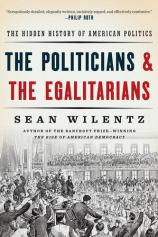The Politicians and the Egalitarians: The Hidden History of American Politics
Review
The Politicians and the Egalitarians: The Hidden History of American Politics
In this contentious election year, there's value in stepping back from the cacophony of the daily news cycle to reflect on the tribulations of earlier eras in American political history. Bancroft Prize-winning Princeton history professor Sean Wilentz (THE RISE OF AMERICAN DEMOCRACY) offers such a respite in THE POLITICIANS AND THE EGALITARIANS: The Hidden History of American Politics. Unfortunately, despite the depth of his knowledge and scholarship, Wilentz fails to deliver on his promise to explain fully the "two keys to unlocking the secrets of American politics and American political history" --- the "permanent reality and the effectiveness of partisanship and party politics" and the "struggle against economic inequality."
Wilentz opens the volume with two helpful surveys that seem to lay the foundation for a more expansive discussion of his ostensible subjects. In the first, he dismisses as naive, and perhaps even dangerous, the notion that American politics should evolve toward some type of postpartisan Nirvana, such as the one many envisioned with the election of Barack Obama in 2008. Instead, he argues (and as many idealists throughout American history have learned to their dismay) that all of our great political reforms --- beginning with Jeffersonian Democracy and culminating in the "counterreformation of the age of Ronald Reagan″ --- have involved "partisan politicians advancing basic and far-reaching political principles."
Wilentz moves on to sketch America's "forgotten egalitarian tradition," describing how the primacy of the fight for racial and economic equality has waxed and waned over the more than 200 years of the nation's existence. Both of those gross disparities have assumed a prominent role in this year's election campaign, and, as Wilentz reminds us, "those who would salvage and modernize this American tradition had better be about their work."
"Despite its billing, THE POLITICIANS AND THE EGALITARIANS often feels more like a work of historiography than one of substantive history."
Most of the fault with Wilentz's approach flows from his book's structure. Rather than develop a sustained narrative to support his provocative thesis, each of the essays and book reviews that comprise the book --- about half of which appeared in different form in the New Republic, with most of the rest culled from earlier versions of Wilentz's writing for the New York Review of Books --- stands as a self-contained entity, leaving the reader to piece together the necessary connections. Wilentz's own views typically stand in pointed opposition to those of a work under review, presenting a challenge for readers not steeped in the historical controversy to follow the thread of his argument.
That flaw surfaces most dramatically in "Life, Liberty, and the Pursuit of Thomas Jefferson." The bulk of that chapter consists of an often highly dismissive ("worse than feeble") critique of Conor Cruise O'Brien's THE LONG AFFAIR and Gary Wills' NEGRO PRESIDENT. Both of these works, in Wilentz's aggressive view, unfairly focus on the contradiction between Jefferson's own slaveholding and the egalitarian principles he espoused. But even Wilentz concedes that Jefferson remains an "abiding torment" to Americans. "By his best examples and his worse, he still eats at American consciences," he writes.
Wilentz's methodology is repeated in essays like the one on Abraham Lincoln, where he derides historians who try to locate Lincoln's success in the beauty of his prose and not his skill in the art of politics. The historical revisionism of director Oliver Stone and Peter Kuznick in their THE UNTOLD HISTORY OF THE UNITED STATES, the subject of "The Cold War and the Perils of Junk History," hardly seems like a worthy target for a scholar of Wilentz's stature. And in the piece that concludes the book, "Lyndon B. Johnson: The Triumph of Politics," he takes Robert A. Caro --- hard at work on the fifth and final volume of his magisterial Johnson biography --- to task for the anti-Johnson perspective of the fourth installment of that work.
Profiles of less well-known figures of American history --- "the American Revolution's most popular and consequential pamphleteer," Thomas Paine; "violent charismatic antislavery terrorist and would be insurrectionist," abolitionist John Brown; and African-American scholar and activist W.E.B. DuBois, "an architect of what became the modern civil rights movement" --- should serve as a valuable introduction to the lives of these men for many readers. Wilentz also offers a succinct and sobering account of the violent lockout and strike at Andrew Carnegie's Homestead Works in 1892 that presaged the decline of both the American labor movement and the country's steel industry.
Despite its billing, THE POLITICIANS AND THE EGALITARIANS often feels more like a work of historiography than one of substantive history. The subjects of political partisanship and the battle to make America a more equal society are worthy of rigorous consideration. Sean Wilentz has the scholarly qualifications and skill to produce that book, and one can only hope it will be forthcoming someday.
Reviewed by Harvey Freedenberg on June 3, 2016
The Politicians and the Egalitarians: The Hidden History of American Politics
- Publication Date: May 23, 2017
- Genres: History, Nonfiction, Politics
- Paperback: 400 pages
- Publisher: W. W. Norton & Company
- ISBN-10: 039335413X
- ISBN-13: 9780393354133





